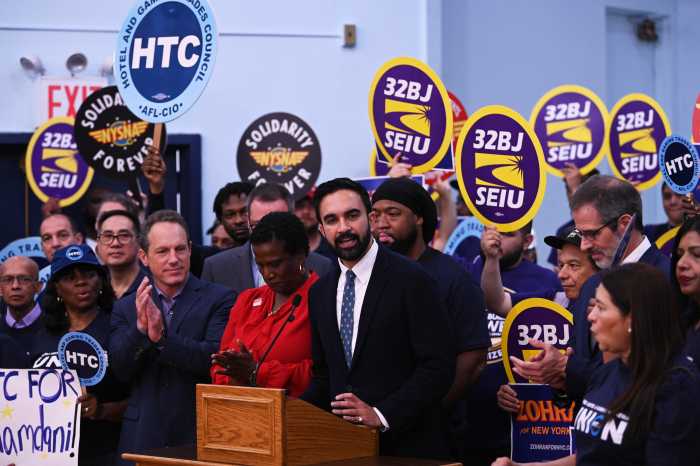By Alexander Dworkowitz
Federal agents pulled the plug on a suspected Flushing-based heroin ring this week with the arrest of nine people charged with smuggling the drug inside traditional Afghan wedding dresses, U.S. Attorney James Comey in Manhattan said.
Eight of the men were arrested Monday morning and were later arraigned in front of U.S. Magistrate Judge Douglas F. Eaton in federal court in Manhattan on charges of conspiracy to import heroin, while one man was arrested back in August, prosecutors said.
They each face up to life in prison and $4 million in fines if convicted. Three of the suspects still are at large.
The ring operated by sending the drug sealed inside the dresses from Pakistan to a Manhattan post office box, according to testimony by Patrick Hamlette Jr., a special agent with the Drug Enforcement Administration, in the criminal complaint.
All of the defendants were born in Afghanistan, prosecutors in the U.S. Attorney's Office in the Southern District said.
Authorities secretly recorded meetings between a confidential informant and the defendants, many of whom conducted their transactions out of apartments in Flushing, Hamlette said.
The informant first met with one of the defendants, Mohammad Daud Rahimi, at the Afghan Independence Festival in Flushing Meadows Corona Park in August 2001, Hamlette said.
Through Rahimi, the informant arranged to buy heroin from dealers in Pakistan, who in turn got the drug from Afghanistan, Hamlette said. Afghanistan is the world's largest source of opium, which is used to make heroin.
Federal authorities were looking into the possibility that some of the money had made its way into the hands of terrorist organizations in Afghanistan and Pakistan, a source said.
About 550 grams of the seized heroin was sent to the post office box, prosecutors said. The drug was concealed in heat-sealed plastic tubing sewn into the seams of traditional Afghan women's wedding clothing, a time-consuming technique, prosecutors said.
The informant often dropped off the money to the dealers in apartments on Parsons Boulevard in Flushing, Hamlette said. Flushing has one of the largest populations of Afghan immigrants in the country.
The nine were not the first to be arrested in the sting. In August 2002, authorities arrested Mohammaddin Azizi, a Flushing resident, after he supplied a courier with almost seven kilograms of heroin hidden inside a gym bag, Hamlette said.
The courier, who was also arrested, became a second government informant in the case, prosecutors said.
The first shipment to the post office box was taken by federal agents on Dec. 5, 2001, Hamlette said.
Abdul Wahid, the accused supplier of the heroin in Pakistan, told the informant that “Christmas was the best time to send heroin overseas because the high volume of mail overwhelmed law enforcement in the United States,” Hamlette said.
Wahid also told the informant that scrutiny after Sept. 11, 2001 made shipping the drug extremely difficult, Hamlette said.
The post office box was originally under the name of M. Khan, but the dealers thought the name would arouse suspicion and changed it to Lisa R. Ford, Hamlette said.
On the recorded conversations, the defendants called a kilogram of heroin a “telephone,” a “textile” or a “car,” while heroin dealers were named “chicken stores,” according to Hamlette. Several of the defendants living in the city were employed at fried chicken stores, where Afghan immigrants often work, prosecutors said.
Azizi, Rahimi, Ahmadullah Babury, Mohammad Ismael, Taj Mohammad, Khalil Pacha, Abdul Rashid, Hamayon Salimi, Shah Wali were arrested and charged in the ring, prosecutors said.
Wahad, Ali Ahmed and Shah Mahmood were also charged and were still at large, prosecutors said.
Reach reporter Alexander Dworkowitz by e-mail at Timesledger@aol.com or call 718-229-0300, Ext. 141.
































